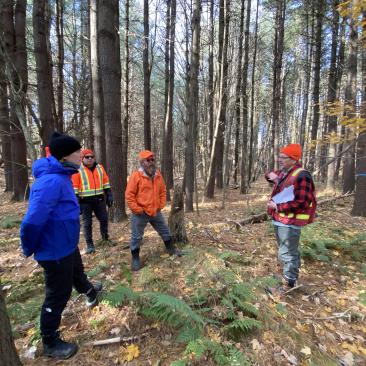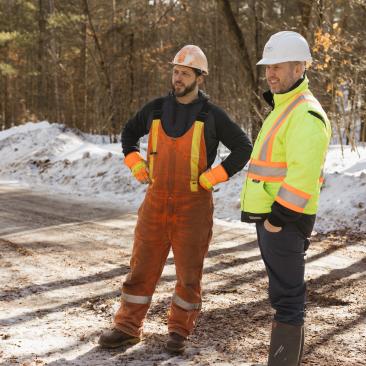An exciting new project, funded by Environment and Climate Change Canada (ECCC), is exploring how management responses in FSC-certified forests can build resilience to climate change and help reduce greenhouse gas emissions
Forests play an integral role in the ability of our planet to balance the complex systems that sustain life. They act as carbon sinks, regulate air temperature, help clean water, and provide habitats for multitudes of species. As well as being a vital resource, they are a powerful natural solution to climate change.
Natural climate solutions can contribute up to 37% of the global emissions reductions required to keep global temperature increases to a comparatively stable 1.5 degrees and approximately two-thirds of this reduction could be achieved by storing carbon in forests (source: Nature United).
FSC-certified forests already adopt high standards of management practice, including setting aside a minimum of 10% of land for conservation, so they are a clear candidate for studying how forest management approaches can contribute to carbon storage, as well as resilience to impacts of a changing climate, including wildfires, pest disturbances and more.
In 2024, this was recognized by ECCC, when they awarded FSC Canada two multi-year grants to support climate resilience and adaptation in Canadian forests.
These projects offer exciting opportunities to contribute to the future of sustainable forestry and inform the development of FSC standards.
Read on to learn what we’ve accomplished in the first year of the program, and how you can get involved.

Project Goals
The Forests as Climate Solutions (FaCS) project has three key objectives:
- Improve the capacity of certificate holders and communities to adapt and respond to climate change.
- Stabilize or reduce greenhouse gas emissions by enhancing and maintaining stored carbon in FSC-certified forests and enhance climate resilience by improving forest health.
- Incentivize climate action by accessing market mechanisms that support communities and reward certificate holders for adopting climate-smart practices.
Year One Activities
The first year of the FaCS project has been focused on building understanding of the current context for climate-related forestry management approaches, as well as gathering the data and information required to inform future phases of the project and make recommendations.
Gathering Expertise
Over the past year, a dedicated FSC team has been convening collaborators across the country in government, policy institutes and think tanks, environmental organizations, academia and Indigenous groups to gather information and understand leading practices in climate smart forestry.
Major milestones have included attending and hosting panel and leadership discussions at the Indigenous Lands Symposium in Sault Ste. Marie, facilitating conservation finance discussions in Ottawa, connecting with stakeholders in Edmonton and partnering with the University of British Columbia in Vancouver to host a two-day forum on leading climate-smart forest management practices.
Researching Best Practices
FSC Canada has partnered with the Smart Prosperity Institute (SPI) to look at how forestry certification schemes can contribute to positive conservation outcomes and enhanced approaches to “climate-smart forestry”. SPI is also looking at the role of Indigenous-led practices, market mechanisms and policy tools and frameworks can play in securing the potential of Canadian forests to provide a critical nature-based solution to climate change.
As well, FSC has engaged the University of Toronto to evaluate carbon quantification methodologies in Canadian forest management and alignment with FSC Canada’s standards and procedures. The research will assess existing methodologies for measuring forest carbon, their compatibility with FSC Canada’s Forest Stewardship Standard and Ecosystem Services Procedure, and their potential to verify carbon impact claims associated with FSC-certified forests.
Training Leaders
FSC is working with certificate holders in Québec, Ontario and the Maritimes, conducting stakeholder engagement and training to enhance understanding and application of FSC’s Verified Impact (VI) tool. The initiative involves outreach to FSC Certificate Holders and forest managers to explore opportunities for enabling investments to maintain and enhance ecosystem services in their forests. Ecosystem services are the non-material but valuable benefits that forests provide, including carbon sequestration and storage, biodiversity preservation, recreation and cultural value, and more.

Piloting Solutions
FSC has commenced a number of pilot projects to test theories about carbon management, fire management, conservation finance and more.
This has included:
- Partnering with Mistik Management Ltd. to understand the strengths of their climate change vulnerability assessments and determine what changes or additions should be included. This work will inform potential recommendations to update FSC standards over time.
- Working with the Nova Scotia Landowners and Forest Fibre Producers Association to evaluate forest carbon measurement techniques, including with innovative “remote sensing” technologies such as drones and LiDAR – laser technology that uses reflected light to measure distances and create maps.
- Working with the Ontario Woodlot Association to demonstrate the carbon conservation benefits of important and needed forest stewardship activities on small forest properties or at the stand level, and to assess how FSC’s ecosystem services procedure can help woodlot owners to demonstrate carbon management and other positive impacts of stewardship practices, leading to potential new funding for this work.
What’s Next
The FaCS project team is currently evaluating Year One learnings and planning further pilots and stakeholder engagement activities in the coming months. We’re excited by these early findings and we look forward to future activities to further understand the potential of managed forests to contribute to climate solutions.
Get Involved
We are very interested in partnering with forest managers, Indigenous communities and others to build on the strong progress made so far. Funding may be available for pilot participants and other key project contributors.
Please contact Vivian Peachey to find out more.
